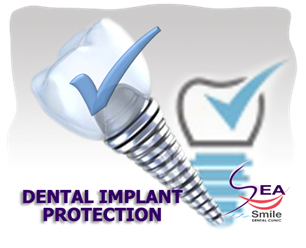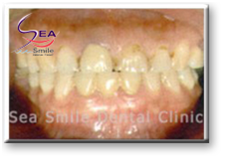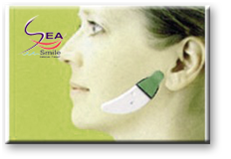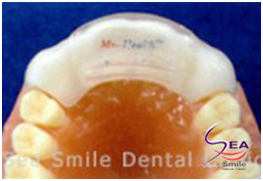|
DENTAL IMPLANT PROTECTION |
After a successful Dental Implant Treatment, you can consider your brand new tooth (or set of teeth) as such a valuable investment. It is already apparent that the treatment is more expensive than its present counterparts, and by that same inclination, your Dental Implants do deserve optimal protection.
Recent studies suggest that 95% of dental implant units do “fuse” or integrate properly and successfully and if taken care of appropriately, they can virtually last a lifetime; thus proving your investment very rewarding and highly beneficial at the same time. In very rare cases, an implant-unit complication after the final prosthetic/dental crown is placed may occur. |
 |
This mainly involves both of the components (implant unit & prosthetic) and are triggered by certain factors like medical conditions (e.g. diabetes/heavy smoking), reduced body resistance, accumulation of plaque, and the most often – from bite stress (occlusion problem). The most obvious symptom would be an unusual redness or swelling of the gums, bone loss, and mobility of the implant-unit. |
EFFECTS OF BITE STRESS ON DENTAL IMPLANTS (BRUXISM) |
While implants are very close to mimicking a natural tooth, they still lack the “stress-release” function provided by the ligaments surrounding a natural tooth. Bite-stress loads applied on the dental crown which is directly passed on to the bones surrounding the implant-unit beneath the gums can cause potential problems such as loosening of the dental crown unit, integration breakdown between the implant unit and jawbone, or implant failure. |
 |
Bite-stress is primarily aggravated by a condition known as Bruxism (involuntary grinding and clenching of teeth). This condition not only causes excessive stress loads to your implants and natural teeth, but it can also speed up their “wear & tear” as well, as the condition produces a 200% higher stress load over regular food-chewing loads.
Recent studies show that Bruxism eventuates in about 30% of the population and 80% of them are unconscious of it. At present, the exact cause of the condition is yet unknown, but scientific research was able to find ways to regulate it through physiological and psychological aspects. Scientists were also able to establish that the condition is relative to certain factors like brain chemistry alteration, genetics, stress, anxiety, and even coffee consumption. The following are common indications if you’re suffering from Bruxism:
✓ Instantaneous wearing, sensitivity, movement, or breaking of teeth
✓ Successive fracturing or frequent dislodgement of dental fillings
✓ Frequent migraine attack (headache), aching of jaw and ears
✓ Clicking sounds on the jaw joints during movement
✓ Instances of jaw joint locking (lock-jaw) |
 |
The last two indications (clicking sounds, lock-jaw) are usually associated with a TMJ (temporo-mandibular joint) Disorder, a cluster of neuromuscular and musculoskeletal conditions. Dentists and oral surgeons usually determine active bruxism with the use of a special diagnostic mouth-guard called a “splint” or the more advanced BiteStrip which can accurately measure bruxism frequencies and other factors associated with the condition. |
As the occurrence of bruxism is as spontaneous to anyone, the condition can still permit someone who has it. Dentists can modify the final prosthetic, specifically the bite-design, or utilize a special shock-absorbing and repairable dental crown (usually made of ceramic composites). To effectively protect your dental implants, the dentist will prescribe the use of a protective mouth-guard to be worn during night time or when you sleep, while habit and behavioural alterations will be used to effectively manage the condition during day time. |
The type of mouth-guard will be prescribed accordingly, which generally depends on the number of dental implants, their location, and severity of the condition. Soft-type Splints are not as sturdy as the Hard-type Splints which are mainly constructed out of acrylic materials. MCIs (MyoHealth Clenching Inhibitors) are “mini” splints which are specifically designed for Posterior Dental Implants. |
 |
Dental mouth-guards or splints are an absolute necessity for bruxism, especially while sleeping when the stress loads of the condition is at its peak and your dental implants are at high-risk. Needless to say, your Dental Implants are valuable investments, thus warranting your utmost care and exceptional protection. |
Contact Us Now to know more about DENTAL IMPLANTS! |
|
